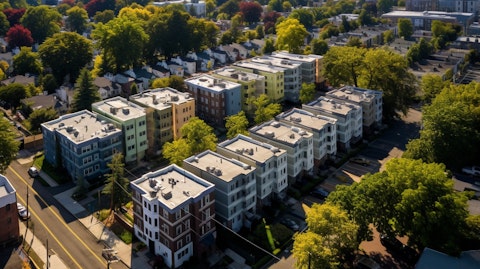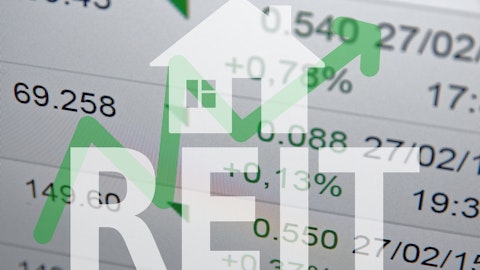Clipper Realty Inc. (NYSE:CLPR) Q4 2023 Earnings Call Transcript March 14, 2024
Clipper Realty Inc. misses on earnings expectations. Reported EPS is $0.15 EPS, expectations were $0.16. CLPR isn’t one of the 30 most popular stocks among hedge funds at the end of the third quarter (see the details here).
Larry Kreider: Good afternoon and thank you for joining us for the Fourth Quarter 2023 Clipper Realty Inc. Earnings Conference Call. Participating with me on today’s call are David Bistricer, Co-Chairman of the Board and Chief Executive Officer; and JJ Bistricer, Chief Operating Officer. Please be aware the statements made during the call that are not historical may be deemed forward-looking statements and actual results may differ materially from those indicated by such forward-looking statements. These statements are subject to numerous risks and uncertainties, including those disclosed in the company’s 2023 annual report on Form 10-K, which is accessible at www.sec.gov and our website. As a reminder the forward-looking statements speak only as of the date of this call March 14, 2024 and the company undertakes no duty to update them.
During this call, management may refer to certain non-GAAP financial measures including adjusted funds from operations or AFFO; adjusted earnings before interest, taxes, depreciation and amortization or adjusted EBITDA; and net operating income or NOI. Please see our press release supplemental financial information in Form 10-K posted today for a reconciliation of these non-GAAP financial measures with the most directly comparable GAAP financial measures. With that, I will now turn the call over to our Chairman and — our Co-Chairman and CEO, David Bistricer.
David Bistricer: Thank you, Larry. Good afternoon and welcome to the fourth quarter 2023 earnings call for Clipper Realty. I will provide a summary of some of our business performance and some existing new developments, after which JJ will discuss property-level activity, including leasing performance and Larry will speak to our quarterly financial performance. We will then take your questions. I’m pleased to report that we have reported record operating income and AFFO, continuing the positive trends from previous quarters. Rental demand continues to be strong at all our properties. In the fourth quarter, Livingston has exceeded the prior rents by 6% across the entire market-based portfolio and our properties were 98% leased.
As for Tribeca House property in Manhattan and the Clover House property in Brooklyn, new leases were $88 per square foot and overall rent levels remained at record levels, $78 at Tribeca House, $81 at Clover House, 40% better than the 63 per foot at the end of December 2021. At Flatbush Gardens, since July, as previously announced, we are operating under a 40-year agreement according to the Article 11 of the Private Housing Finance Law in New York City Housing Preservation Department. Under this agreement, known as Article 11, the elimination of real estate taxes and enhanced rental recoveries for assisted tenants should allow us to profitably provide for our communities for property improvement, tenant assistance, and higher wages. Of course, we are at the early stages and report our progress as we move forward.
Operationally, we are also very pleased with our new ground-up development project of Pacific House at 1010 Pacific in Brooklyn, came online last quarter on budget and is 100% leased and on target to yield a 7% cap rate. The property is located in Prospect Heights, Brooklyn, about one mile from the Atlantic Terminal Barclays Center hub. The property has 175 units, 70% free market and a 30% affordable and this is tax-abated for 35 years. At the nearby 953 Dean Street ground-up development, which is underway, we are completing the superstructure as scheduled, expected to complete the construction on time for 2025 leasing season, utilizing the $123 million construction loan we closed on last quarter. We purchased the land in 2021 and 2022, of which to build a nine-storey fully-amenitized residential building with 163,000 square feet of rentable square feet, 240 units, 70% free market, 30% affordable, 8,500 commercial rental square feet, and again, this is also tax-abated for 35 years.
As the continued high interest rate environment, we believe the higher rates make for high demand for our rental product versus the purchase option and we are buttress by the relatively long duration of debt at our operating profits. Our debt is 93% fixed at an average rate of 3.8% and average duration of 5.5 years, non-recourse, subject to limited standard carve-outs and is not cross-collateralized by anyone of the properties. We finance our portfolio on an asset-by-asset basis. With respect to inflation, we look to short duration and high demand for residential leases to allow us to cover increased operating expenses. With regard to our fourth quarter results, we are reporting quarterly revenue at $34.9 million, record NOI of $20 million, and record AFFO of $6.3 million as a result of the strong leasing and cost reduction I just mentioned.
These results represent significant improvements over the fourth quarter last year and as JJ and Larry will further detail. I will now turn the call over to JJ, who will provide an update on operations.
JJ Bistricer: Thank you. I am pleased to report that our residential leasing performance at all our properties continues to improve. At the end of the fourth quarter, all our residential properties had very high occupancy averaging 98% and rents are continuing at record levels, while still recording increases over previous levels. Overall, new lease and renewal rental rates in the fourth quarter exceeded previous rents by over 6% at our free market properties. We expect leasing to remain very strong in the foreseeable future as demand remains high and overall rental housing supply remains constrained in the absence of significant new developments as widely publicized. At Tribeca House and Clover House, we have maintained leased occupancy between 96% to 99% and increased average rent per square foot to $78 per square foot from $71 over the last 12 months and $63 per square foot near the end of the pandemic.

And our new development property, Pacific House, is almost fully stabilized. The 70% free market and 30% affordable property came online at the beginning of the second quarter and was 100% leased at the end of this quarter. We expect the property to achieve a cap rate over 7% in 2024 in line with original underwriting. At the Flatbush Gardens property, we are pleased to be operating under the new Article 11 agreement made with the Housing Preservation Department of New York City that was completed on June 29, 2023. We received the full abatement of real estate taxes beginning July 1, have begun completing the capital projects we committed, have begun placing formerly owns residents and have begun obtaining the enhanced reimbursement under Section 610 of the Private Housing Finance Law for tenants receiving assistance.
The benefits we receive will allow us to profitably improve the property. We are also getting increases from non-assisted tenants where increases have been permitted on the rent guideline board for the last couple of years at the 3% level per annum. As a result, overall average rents for the property are increasing, rising to $26.69 per square foot at the end of the quarter versus $25.97 at the end of the last year. Operationally, our other residential properties at 10 West 65th Street, Aspen, and 250 Livingston Street continue to perform well. Average lease occupancy for these properties has been above 96% and average incremental rates have increased 11% from a year ago. Rent collections across our portfolio remain as expected at seasonally high levels.
The overall collection rate in the fourth quarter was over 95% despite the lingering challenges of the pandemic. Looking ahead, we remain focused on optimizing occupancy, pricing, and expenses across the business, expeditiously completing our development projects and fully implementing the Article 11 transaction to the best — to best position ourselves for growth. I will now turn the call over to Larry, who will discuss our financial results.
Larry Kreider: Thank you, JJ. For the fourth quarter, revenues increased to a record $3.9 million from $33 million last fourth quarter by $1.9 million or excluding the impact of Pacific House that came online in the second quarter, an increase of $0.7 million. NOI this quarter was $20 million, an increased of $2.8 million from last year or $2 million, excluding the impact of Pacific House. AFFO this year was $6.3 million, an increase of $1.6 million from last year or $1.9 million, excluding the impact of Pacific House, which reflected full interest expense since going online, but only partial initial lease-up. For the fourth quarter, residential revenue increased to $25.1 million by $2.1 million or a $1 million revenue increase, excluding the impact of Pacific House.
This 4% increase was primarily due to higher residential rental rates for all properties from continued strong leasing previously discussed. Bad debt expense was substantially the same as last year, reflecting high and stabilized collections. A $300,000 decline in commercial rental income was caused by a couple of leases at the Aspen property that are being replaced. On the expense side, key year-over-year changes quarter-on-quarter were as follows. Property operating expenses were flat compared to last year, excluding the impact of Pacific House, primarily due to lower utilities costs, mostly offset by higher repairs and maintenance and payroll at the Flatbush Gardens property to make necessary repairs and to comply with wage requirements under the Article 11 transaction.
Real estate taxes and insurance decreased by approximately $1.3 million in the fourth quarter year-on-year, excluding the impact of Pacific House; $1.8 million due to elimination of real estate taxes at Flatbush Gardens, partially offset by $200,000 for routine increases in real estate taxes at the other properties and $300,000 for insurance cost increases. General and administrative costs decreased by $300,000 in the fourth quarter year-on-year, primarily due to lower audit costs and compensation-related expenses. Interest expense increased by $300,000 in the fourth quarter year-on-year, excluding the impact of Pacific House due to conversion of the debt at the 10 West 65th property to variable rate according to its terms and the elimination of capitalized interest for Pacific House.
With regard to our balance sheet, we have $22.2 million of unrestricted cash and $14.1 million of restricted cash. In the fourth quarter, we had no new debt activity other than draws under the construction loan that we closed last quarter for our Dean Street property development. We financed our portfolio on an asset-by-asset basis. Our operating debt is non-recourse subject to limited standard carve-outs and is not cross-collateralized. The average duration of debt of our operating properties is 5.5 million — 5.5 years and 93% of our debt at our operating properties is fixed rate at an average rate of 3.87%. Today, we are announcing a dividend of $0.095 per share for the fourth quarter, the same amount as last quarter. The dividend will be paid on April 4, 2024 to shareholders of record on March 27th, 2024.
Let me turn the call back to David for concluding remarks.
David Bistricer: Thank you, Larry. We remain focused on efficiently operating our portfolio. We look for our current operating improvements to continue through 2024 into 2025. We look forward to capitalizing a myriad of growth opportunities, including optimizing the Flatbush Gardens Article 11 transaction, the Pacific House, 953 Dean Street developments, and capitalizing other possibilities that may present themselves. We look forward to the transition of the 250 Livingston tenant, and the VCAS [ph] lease, which is coming up at the end of 2025. Thank you. We look forward to seeing you in the next quarter.
See also 15 Best Retirement Stocks to Buy According to the Media and 11 Best Vanguard ETFs For 2024.
Q&A Session
Follow Clipper Realty Inc. (NYSE:CLPR)
Follow Clipper Realty Inc. (NYSE:CLPR)
Receive real-time insider trading and news alerts
Operator: Thank you. The floor is now open for questions. [Operator Instructions] The first question comes from Buck Horne with Raymond James. Please proceed.
Buck Horne: Hey good afternoon guys. I was wondering if we could start with just 250 Livingston and the situation with the lease and the notification that the City of New York plans to vacate. Just can you walk us through what the next steps are in terms of either trying to re-tenant the building or what your options are if re-leasing the space is not realistic? Do you — you have a $125 million mortgage out on the property, does it make sense at some point to consider just handing the keys back?
David Bistricer: We think that’s a premature type of a conversation. The city was — basically VCAS organizes all the leases for the city, is looking in the marketplace for a new building occupation from about 300-something thousand square feet by one of the affiliated agencies. We are told that this building at 250 and the other building we have at 141 is a prime candidate for us. There’s no guarantee, obviously, that we will be awarded that opportunity. But we’re working diligently to try to get that tenant into our building. That would be an improvement of what we have right now. We are in a position to be able to renovate that building if we had to, to accommodate a new tenant. We have an excellent relationship with VCAS over the many, many years.
And in that particular marketplace, I think we’re in a good position for the cost basis that we have in the building to be able to compete very aggressively in the marketplace to the tenant the rent that they’re looking for. That’s only one option and that’s the one that we’re most focused on at the moment.
Buck Horne: Okay, appreciate that. Do you have any idea realistically what the cost to put in the tenant improvements or additional CapEx in the 250 Livingston, any range investment on what that would cost to get that ready for a new tenant?
David Bistricer: We don’t know yet because we haven’t got that granular with this conversation. But usually, the way it would work is whatever we were putting into the building would be met by — obviously we’re making $50 a foot on that particular tenancy. It’s not a very high rent for the marketplace, it was a fair rent for the condition of the building and the tenant. Any money that we invest in the property will be always tested by return on equity to commensurate the lease at our investment. We were just putting the money to building that to get back a fair return on it. So, it will be a long-term lease. It will be for accredited lease tenant VCAS leases are all accredited at good credit. So, that will be commensurate with those two things, creditors and also the amount of money.
Usually what they’re looking to do is not that most commercial tenant ask for a lot more luxury types of improvements. This is a really very, very, I think, [Indiscernible] kind of an operation that the agencies look for. So, we will have more details than that. Right now, we’ll see as it goes along, we will report when we have something to report.
Buck Horne: Got it. And for now, the — any income and revenue from the building goes into an escrow account. Is that how this works until — what requirements may be satisfied before you can start continue booking revenue from the building again?
David Bistricer: The revenue is the revenue. Nothing can stop the revenue. So that at least the revenues will be reported by the company and it’s taxable by the company, whatever tax it is. It’s our revenue. Whether there’s going to be an escrow account, yes, that has not been determined yet.
Buck Horne: Okay. Got it. And my last one is just simply just from a larger or a bigger picture, I guess, just noting where shares are trading and relative to even our estimates of what the NAV of the company is. Is there a consideration or longer term thought of — does it make sense to look at a potential property sale to try to either delever the balance sheet and/or potentially deploy some proceeds in the stock repurchases?
David Bistricer: We haven’t yet discussed that yet with the property. The value of the stock, the price of the stock has been where it is for quite some time. Obviously, we cannot think indicative where the overall market is. That discussion has not yet been considered yet that you’re referencing.
Buck Horne: Got it. All right guys. Thanks.
David Bistricer: Thank you.
Operator: [Operator Instructions] I would now like to turn the floor back to management for closing remarks.
David Bistricer: Thank you for joining us today. We look forward to speaking with you again soon. Have a good evening.
Operator: Thank you. Ladies and gentlemen, this does conclude today’s conference call. You may disconnect your phone lines at this time and have a wonderful day. Thank you for your participation.
Follow Clipper Realty Inc. (NYSE:CLPR)
Follow Clipper Realty Inc. (NYSE:CLPR)
Receive real-time insider trading and news alerts



